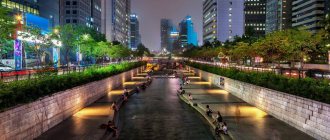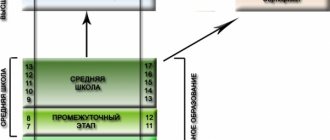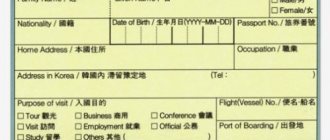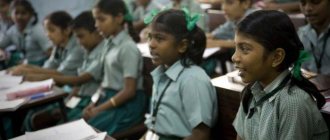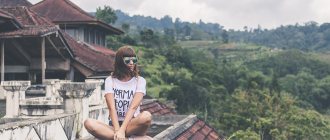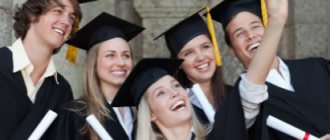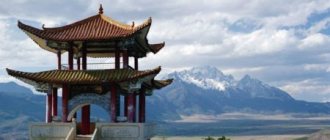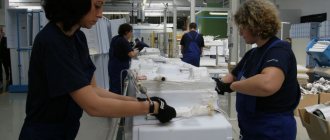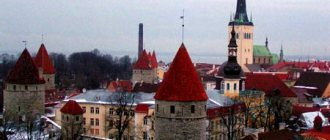Education in South Korea is becoming more and more popular for foreign students every year. Not only citizens of China, Japan and Vietnam, but also European countries, Canada and the USA strive to enroll in the country's universities. There are many Russian students in Korean universities.
Why is education in Korea so attractive? High quality of knowledge, career prospects and relatively low prices. What does the education system look like in South Korea, how to enter a Korean university, and is it possible to find education in Korea for Russians for free? We will try to answer all these questions in the article.
Do you want to receive even more useful material from the world of education? Subscribe to our information channel on Telegram. And don’t forget about the second resource - the most current company promotions and discounts are available on it.
Help is needed?
Entrust your work to a PhD candidate!
Education in South Korea: interesting facts
The education system in South Korea has its own characteristics and differences from European and Russian approaches to education. But before we talk in more detail about the system of preschool, primary, secondary and higher education in the Asian republic, let's get acquainted with unusual facts:
- The compulsory period of education in Korea lasts nine years. It includes primary and secondary schools (from 6 to 15 years). However, almost all schoolchildren go on to study further, because their future depends on education.
- The period of study in Korea differs from that in Europe. Here the educational year begins in March and lasts until February.
- There is no free education in South Korea. Parents even pay for preschool education.
- The cost of studying in South Korea is an order of magnitude lower than in European and American universities.
- How much does it cost to study in Korea for foreigners? Thanks to a law passed by the Korean government, foreign students pay the same tuition fees as citizens of the country.
- Education in Korea combines high technology and traditions of oriental thinking. So, here they pay a lot of attention to following rules and order.
- The principle of equality operates in Korean schools and universities. Therefore, to decide who will go to the board, the teacher casts lots, and does not choose the student himself. The same system applies to the transfer of teachers to educational institutions in the country.
- In South Korea, schoolchildren and students are prohibited from using mobile phones while studying. They leave all gadgets in special compartments before classes.
- Since childhood, Korean schoolchildren are taught to be clean and to pick up after themselves. So, each student has his own garbage bag, which he attaches to his desk.
- In Korean educational institutions, lectures rather than practical classes predominate. Students must independently study a large amount of information, which leads to cramming rather than understanding the material.
- Education in South Korea is taken very seriously. Therefore, even the youngest students have virtually no free time, are constantly studying and suffer from high levels of stress. This explains why Korea has a high suicide rate.
South Korea is one of the four “Asian Tigers”. This is the name of eastern countries whose economies are developing at a very fast pace. Thus, Korea ranks 4th among Asian countries and 14th in the world in terms of living standards. The “Asian Tigers” also include countries such as Hong Kong, Taiwan and Singapore.
Information for domestic applicants
Studying in Korea has been attracting both Russian students, Kazakhs and Ukrainians for many years. In order to obtain higher education in 2021, it is important to prepare the necessary package of documents in a timely manner.
An important nuance
Higher education at one of the South Korean universities in 2021, as indeed much earlier, is possible only after completing at least the first year at a Russian university. Otherwise, it is, alas, impossible to enroll in a South Korean university. Therefore, it is important to initially choose a specialty that is actively studied in South Korea.
In order to become a student at a South Korean university, you must send a request to the international department.
The employees of this department undertake to tell the applicant from Russia what educational programs exist for him. The choice of the current program may depend on the level of English language proficiency and Russian education.
Also, when applying to a South Korean university, an applicant from Russia must request a list of documents relevant for admission. It is important to consider that private higher education institutions often have their own list. This point must be worked out at least a year before admission. It is important to clarify in advance what grants are available. If grants exist, then you need to clarify the list of required documents.
Faculty of South Korean University
Then, in 2021, a Russian applicant wishing to obtain higher education at one of the South Korean universities is required to submit the following documents:
- resume with correct data and clearly indicated place of study;
- high-quality photocopies of all available certificates that can confirm proficiency in English or Korean;
- motivation letter;
- document confirming that the applicant is studying at a specific educational institution.
Applying for a student visa
A person who wishes to obtain higher education at one of the South Korean universities is obliged to obtain a special visa document in 2021.
To obtain a visa, you will need to submit the following documents:
- an unexpired foreign passport;
- non-expired civil passport;
- 2 high-quality photographs (color);
- application form (filled out in Korean or English);
- diploma or certificate (a photocopy must be certified by a notary);
- a document confirming enrollment in a particular faculty of a South Korean university;
- document confirming payment of tuition;
- a certificate confirming financial solvency;
- health insurance.
If a person under the age of majority travels to South Korea, then in 2021 he is obliged to provide parental permission to leave and a document confirming his birth.
This is what a student visa to South Korea looks like
Foreign students have the right to employment. Work should not take more than twenty hours during the training period. During the holidays you can get a job for any period of time.
Education system in South Korea: briefly
Education in South Korea consists of several levels. Let's take a quick look at what stages Korean students go through and what educational options they have:
| Pre-school education (optional) | School education (compulsory until age 15) | Secondary education (optional) | Higher education |
| nursery (nariban) - from 3 days to 3 years. | primary school - from 6 to 12 years: public schools (chhodyn hake); private schools (hagwon). | colleges (2-3 years). | universities: Bachelor (4 years); Medical Bachelor (6 years). |
| middle groups (orinichib) - from 3 to 5 years. | secondary school (chunhake) - from 12 to 15 years. | vocational schools (2-3 years). | Master's degree (2-4 years). |
| senior groups (yuchiwon) - from 5 to 6 years (preparing for school). | high school (kodinhakke) (optional) from 15 to 18 years. | postgraduate education: Doctoral studies (4 years). |
Hagwon are elementary private schools where every child dreams of studying. There is a competition for such establishments - at least 2-3 people per place.
Organization of the educational process
Seoul University's curricula are designed according to US standards. Students independently choose subjects to study, the number of which depends on the course - on average from 3 to 7 disciplines per semester.
The class schedule is compiled individually. The material is presented in the form of lectures, presentations, and discussions. Visits from famous speakers are the order of the day.
The academic year, which begins in March and ends in February, consists of two semesters. During the semester you need to obtain a certain number of points (credits), which are gained based on test results. During the summer and winter holidays you need to take two sessions.
The university uses a relative system for assessing students' knowledge. For example, you might get a low score on a test where you got 85% correct if most of the students in that course wrote better.
The duration and cost of training depend on the chosen program. The average duration of study is:
- Bachelor's degree – 4 years;
- Master's degree – 2 years;
- Doctoral studies – 3–4 years.
For one semester at Seoul University as an undergraduate, you will have to pay from $2,100 (humanities, business administration) to $4,300 (medical sciences). Graduate school costs between $2,800 and $5,200 per semester.
Preschool education in South Korea
Preschool education in Korea is optional, but most parents prefer to send their children to nurseries and kindergartens. There are several reasons:
- the desire for the child to develop from an early age;
- high workload of parents themselves.
Primary preschool education in South Korea consists of three stages:
- nurseries: children can be sent on the third day from birth (!) and up to 3 years;
- middle group: from 3 to 5 years;
- senior group: from 5 to 6 years old - children are actively prepared for school here.
In kindergartens, the main emphasis is on children acquiring basic knowledge. They are taught to speak and read, given the basics of mathematics, introduced to English, and given music and physical education lessons.
Physical education lesson in Korean school
“In Seoul you can wear shorts and flip-flops”
Seoul is even louder than Moscow - it seems that it never sleeps.
Life here is very rich: galleries, museums, events, clubs. Seoul falls asleep at 7-10 am because there are a lot of parties in the city. To drink coffee at eight in the morning, I need to go to a 24-hour cafe. At this time there are no people on the streets at all. Koreans like to sit in a crowd at a restaurant, eat meat and drink beer or soju - a Korean alcoholic drink. In Moscow, it’s customary to dress up, but here you can walk around in shorts and flip-flops. The big difference is how people behave. For example, in Seoul you cannot smoke on the streets. They take waste separation very seriously here: there are even separate bins for clothing and certain fabrics for recycling.
South Korea has slightly different rules of behavior. In Russia, from childhood you are taught not to slurp, but Asians eat very loudly. This is unusual for a Russian person.
The younger generation takes great care of themselves - they want to look perfect. It's normal for guys to wear chapstick. Plastic surgery is very popular in Korea; it is inexpensive and of high quality.
In Seoul, traditional small houses can be found next to office high-rises, and sculptures stand in front of skyscrapers. As an art critic, I am very attracted to such artistic diversity. I also like that people are friendly - if you need it, they will definitely help you. My classmates always ask how they can help me, whether I understood everything in the lectures, how I’m doing.
Of course, Europeans are considered models of beauty here. But for some reason I am often mistaken for a Korean.
Seoul
Schooling in South Korea
School education in South Korea consists of three educational levels:
- primary school (compulsory education): from 6 to 12 years;
- secondary school (compulsory education): from 12 to 15 years;
- high school (non-compulsory education): from 15 to 18 years old.
Elementary school in South Korea
Korean schools do not assign homework. There the teacher can give additional exercises that the child can solve if he wants. The main emphasis is on the development of the following subjects:
- Korean;
- English language;
- mathematics;
- social Sciences;
- music;
- drawing.
The traditions of inclusive education are very developed in South Korea. Here special children study in regular classes together with other children. They are helped to adapt and receive secondary education, while ordinary children are taught mutual assistance and acceptance.
High school in South Korea
In high school, the workload and demands on students increase. All students are required to wear a school uniform; the use of cosmetics is prohibited. Of the new educational subjects, Korean schoolchildren master:
- introduction to art history;
- history;
- Chinese characters;
- economics;
- ethics;
- computer science
Every day schoolchildren have six lessons. At the same time, they arrive half an hour earlier in order to have time to prepare, and after the last lesson they often go to additional courses at private schools.
High school in South Korea
Most Korean students choose to continue their education in high school, although this is not a compulsory level. It is very difficult to study here: there can be up to 11 different subjects per day, after studying there are additional classes in courses and sections. High school students often return home very late and rarely get proper rest.
Already at this stage, schoolchildren can choose a direction for further professional development:
- scientific disciplines;
- linguistics;
- art.
Korean schoolchildren are required to wear uniforms with the school logo
Secondary education in South Korea
Many people call colleges and vocational schools an alternative to higher education in Korea. However, more often they are used as a springboard for entering university.
Secondary education in Korea is not compulsory and comes in two forms:
- colleges;
- vocational schools.
Despite the fact that secondary education in Korea is not compulsory, 98% of all students enter and graduate from college. This is the highest figure in the world.
Colleges in South Korea
Korean colleges themselves provide good professional training. However, becoming a student at such an educational institution is not so easy. To do this, you need to pass a very difficult exam - suneung, which tests knowledge in mathematics, Korean and English. It can be compared with the Russian Unified State Exam. Koreans prepare for this exam from the first grade of elementary school.
College education itself usually lasts two years. For educational programs in art history, shipping and agriculture, the period is longer - it can reach up to 4 years.
By the way! Our readers now have a 10% discount on any type of work.
Vocational schools in Korea
Those who do not want to follow a university program choose vocational schools. Here, in two to three years, you can get excellent training in various crafts, and also become a specialist in the following areas:
- preschool education;
- home economics;
- Agriculture;
- fishing;
- nursing and others.
The educational program includes specialized (70%) and general education (up to 30%) subjects. The greatest emphasis is placed on internships and the acquisition of practical skills.
Gyeongbokgung Palace with cherry blossoms in spring
Pros of higher education
Teaching at universities in South Korea is conducted in English and Korean. The undeniable advantages of higher education in the country include:
- Professionalism of teachers. To get hired, every teacher must pass a strict selection process.
- The use of high-tech equipment in educational processes.
- Grants and scholarships for international students.
- Opportunity to develop on a topic of interest in additional classes, trainings, courses.
Read about studying in South Korea.
The Korean education system also has its disadvantages. Find out about them in the video.
Organization of the educational process
An important advantage of South Korean higher education is the opportunity for students to create their own study schedule and choose the disciplines they need to study.
There are no usual lectures at universities. Instead, discussions and seminars are used. They are aimed at ensuring that the student not only learns the necessary information, but also thinks, reflects, and publicly defends his point of view.
Practical exercises are used to identify the level of knowledge acquired by the student. To advance to the next semester, a student must achieve a certain number of points. When calculating the latter, the following is taken into account:
- Student attendance.
- The quality of homework.
You need to take an exam twice during the semester: first, the intermediate exam, and at the end of the semester, the final exam.
Note : the school year in Korea begins in March and ends in February. The duration of the first semester is from March to August, the second begins in September and ends with the onset of February. Holidays: July and December - January.
The educational process is carried out throughout the week, except weekends (Saturday and Sunday).
South Korean education system
An important difference between local educational institutions is the strictest discipline. Those who do not follow the rules, are constantly late or miss classes, may not only be expelled, but deported to their homeland.
If a foreign student wants to earn extra money, he is not prohibited from doing so. Find out about working in South Korea by following the link.
You can find a job after six months of study. But during the educational process, the working week should not exceed 20 hours. During the holidays this restriction does not apply.
Existing programs
The following types of universities exist in South Korea:
- Universities.
- Vocational colleges.
The duration of training depends on the type of educational institution:
- College education is completed in two, maximum three years.
- You need to study for a master's degree for two years.
- The duration of bachelor's and doctoral studies is four years.
- To obtain any medical specialty, you have to acquire knowledge for at least six years.
Top Universities in South Korea
One of the traditional principles of Korean society is a strict hierarchy. This is also reflected in education. Thus, it is worth considering that in South Korea, provincial universities are initially considered less prestigious than capital ones. And the top three universities are called SKY and look like this:
- Seoul National University.
- Korea University.
- Yonsei University.
All of them are located in Seoul, the capital of South Korea, occupy high places in international university rankings and provide their graduates with good career prospects.
Seoul National University
This is a leading public university, which is considered one of the most innovative in the country. It was founded in 1895, but the official birthday of the university is celebrated on August 22, 1946. Then the merger of 10 different educational institutions into one university took place.
Seoul National University provides excellent training in technical, humanitarian and scientific specializations, being a general university.
Seoul National University. View from above
Korea University
Korea University is a private Korean university that conducts research within its walls. It was founded as a college in 1905 and later granted university status. Strong areas of the university: humanities and natural sciences.
A distinctive feature of the university is its active participation in international university associations. For example, in W100 Reputation Network. This is a group of universities that conducts research in the fields of marketing and economics.
Yonsei University
Yonsei University (or Yonsei) is one of the largest and oldest universities in Korea. This is the country's first medical university, which was founded in 1885. In addition to medicine, arts, humanities, social sciences and management are also considered strong areas.
Many scientific discoveries were made within the walls of the university: they developed a serum against swine flu, came up with a new way to cool the air and a solution that patches cracks on roads under the influence of sunlight. They are also actively searching for a cure for cancer.
Yonsei University
Leading Universities
Today there are about 400 higher educational institutions in the Republic. The best universities in Korea are very easy to remember. To do this, use the simple abbreviation SKY:
- Seoul National University - Seoul National University is the largest and most prestigious university in the country.
- Korea University - Korea University is a famous humanitarian university.
- Yonsei University – Yonsei University is the best medical school in Korea.
In 2021, Seoul University and University of Advanced Technology were ranked among the top 50 universities in the QS World University Rankings. But the top 50, according to QS Rankings Asia-2019, included 9 South Korean higher education institutions.
Below is a ranking of Korean universities within the country.
Seoul National University
(Seoul National University) is the leading and largest educational institution located in the South Korean capital. The university unites several areas - technical, humanitarian, scientific. In the Thomson Reuters ranking, the university is among the thirty best innovative educational institutions on the planet.
The university was founded by order of the emperor in 1895, but the official date of its opening is considered to be August 22, 1946, when 10 educational institutions united under the roof of the university.
Seoul University offers training in the following faculties:
- engineering and innovation;
- humanities;
- natural sciences;
- social sciences and management;
- art.
The university is famous for its innovative developments in nanotechnology and materials science, chemistry and astrophysics. All this makes the country's main university an attractive place for young scientists and researchers.
The university is located on three campuses in different areas of Seoul:
- Gwanakku Central Campus is located in the very center of the city;
- Yangon can be found on the banks of the picturesque Han River;
- Pyeongchang is a new building located outside the city, in the mountains.
Tuition fees at the university range from $2,500 to $6,500 per semester. Accommodation in a dormitory will cost $3,000 for the entire year.
Almost 2/3 of South Korea's judges and more than half of its politicians are university graduates. The educational institution is one of the universities that cooperate with major world organizations, such as the UN and the World Bank.
Study at Koryo University
(Korea University) is a private educational institution with a focus on research. The university is also located in Seoul. It was founded with the support of Emperor Gojong in 1905 at Boseong College.
The university is famous for its large-scale international activities and is part of the W100 Reputation Network, known worldwide for research projects in the field of marketing and economics.
University graduates are in great demand among Korean employers, since training is carried out with an emphasis on applied specialties. Leading faculties:
- architecture;
- business management;
- medicine;
- linguistics;
- natural sciences;
- mathematics;
- school of design and art.
The university's School of Medicine unites three hospitals that are reputed to be the best in the country. The university conducts research in the fields of statistics, mathematical modeling, pharmaceutics and pharmacology.
The cost of studying at a university varies depending on the specialty:
- humanities courses cost about $3,300 per semester;
- natural sciences - about $3,700.
Every six months of study, students also pay an administrative fee ranging from $63 to $180 (depending on the department).
It is important to know that Korea University supports high-achieving students. Those with a GPA above 2.8 (maximum score 4) can expect to have half of their study costs covered, including the mandatory fee. If the score is over 3.3, the university pays for your studies in full.
The university consists of two campuses: Annam is located in the southeast of Seoul, and Sejong is in the city of the same name. The distance between them is a little more than 100 km.
To study at Ense University
(Yonsei University) is useful for those looking for the best medical universities in Korea. The university is one of the largest research universities in the country, where outstanding discoveries were made:
- a new way to cool the air - an air conditioner that does not use coolant;
- a unique highway coating that, when cracks appear, heals damage using sunlight;
- serum against swine flu;
- a technique that allows you to protect medical equipment in field conditions.
Training is conducted in many areas. The structure of the university includes:
- liberal arts college;
- College of Business;
- Faculty of Natural Sciences;
- Faculty of Engineering;
- Faculty of Biotechnology and Natural Sciences;
- Faculty of Theology;
- Faculty of Social Sciences;
- College of Law;
- College of Music;
- Faculty of Human Ecology;
- medical school;
- College of Pharmacy.
The university is located in the central part of Seoul, has a well-developed infrastructure, a library, and includes 3 campuses. One of the largest clinics in the country, Severance, operates on its territory.
The medical research center is equipped with laboratories in the following fields of knowledge: immunology, endocrinology, cell biology, medical genetics, electrophysiology, morphology, radiology, veterinary medicine.
For foreign students, the university operates a summer International Center, which allows them to become more familiar with the features of studying at the university.
Features of Sungkyunkwan University
(Sungkyunkwan University) is a private university that began its activities in the 14th century. In 1946, after Korea achieved independence, the university was revived with funds raised by Confucians from around the world.
The university campus is located in the city of Suwon. It is one of the best ancient universities in South Korea. University faculties:
- engineering;
- information and communications;
- international studies;
- art;
- social Security;
- business.
Tuition fees range from $6,500 to $8,000 per academic semester. The number of students annually reaches 36 thousand people, of which 2,000 are foreigners.
What you need to know about Pohang University of Science and Technology
(Pohang University of Science and Technology) is one of the ten best higher education institutions in the country. Founded in 1986.
The main campus is located in Pohang. The university operates the Tae-Joon Park digital library, located on 6 floors (more than 25 thousand sq. m).
Pohang University has its own football team. In general, the university management pays great attention to the development of sports.
Students are provided with housing in comfortable dormitories, which costs about $160 per month.
University faculties:
- chemistry;
- physics;
- mathematics;
- industrial engineering;
- Materials Science;
- Computer techologies;
- electronics and electrical engineering;
- chemical engineering;
- social and human sciences.
Tuition costs approximately $5,500 per semester.
Study at the Korean Leading University of Science and Technology
(Korea Advanced Institute of Science and Technology) is a state-owned educational institution that has been operating since 1971.
The university campus is located in the city of Daejeon.
Leading faculties:
- humanitarian sciences;
- engineering;
- art history;
- medicine;
- chemistry;
- control;
- Information Systems.
The number of students does not exceed 10 thousand people, 6% of them are foreigners.
The pride of the university is its library and modern sports complex.
Tuition per semester is about $3,500 for a bachelor's degree, but a master's degree will cost about $13,500 for every six months.
Study at Hanyang University
(Hanyang University) is a private university founded in 1939. The main building of the university is located in Seoul.
Training is conducted in 23 colleges, with approximately 34 thousand students. The university cooperates with 280 higher education institutions and offers numerous exchange programs.
Leading faculties:
- engineering;
- architecture;
- sociology;
- medicine;
- natural science;
- pedagogy;
- ecology;
- MASS MEDIA;
- economy;
- international culture;
- business management.
Tuition costs 3-4 thousand dollars per semester. Accommodation will cost approximately $900-1,200.
Why students choose Kyung-hee University
(Kyung Hee University) – private, conducts active research work. The university campuses are located in Seoul, Namyangju and Suwon.
This educational institution with constant stability is annually included in the top ten best universities in the country and in the top 30 prestigious universities in Asia. What you need to know about the university:
- founded in 1949;
- the international department has been accepting foreign students since 1968;
- in 1993, the university received a UNESCO prize for educating the younger generation “in the spirit of peace in the world.”
- the university was the first in the country to begin research work in the field of space;
- in 2021, Humanitas College was named by Forbes magazine as one of the 10 best educational institutions in this field in the Asian region;
- The medical faculty of the university combines 6 branches of knowledge, including traditional medicine, pharmacy, nursing, dentistry, Korean medicine, and care for the elderly.
The following faculties are united under the roof of the university:
- humanities;
- economics;
- jurisprudence;
- tourism;
- exact and natural sciences;
- life sciences;
- music;
- engineering;
- physical education/sports and others.
One semester of university studies will cost approximately $3,500.
Studying at Ewha Womans University
The list of Korean universities that are popular goes on (Ewha Womans University). The university is a partner of Peking University and Harvard. Half of the female ministers in South Korea are Ewha graduates.
The university appeared on the basis of a women's college established in 1910. But the university received official status only in 1946. Until 2004, only unmarried women studied here. Today, the university has about 23 thousand students, most of whom are women.
On the university campus there is a library, a sports complex, and two student dormitories. Leading faculties:
- humanitarian;
- Social sciencies;
- natural Sciences;
- engineering;
- music;
- Architecture and design;
- business management;
- industry and science;
- nursing;
- international studies.
Tuition per semester is $3,500–$4,500. But accommodation will cost about 1,000-1,500 dollars per month.
Higher education in South Korea for Russians
Studying in Korea for Russians is no longer a dream, but a realistically achievable goal. We will now tell you what options there are for admission and how much education in Korea costs.
South Korea: training for foreigners
Foreign students have two ways to enter Korean universities:
- come to study as an exchange student;
- do it yourself.
A big plus of Korean education is the availability of English-language programs. There are about 30% of them. However, if you dream of not just studying in Korea, but staying there, it is better to spend time learning the Korean language and choose the appropriate course.
To successfully study in South Korea, Russian applicants must pass the TOPIK (Test of Proficiency in Korean) language test. This is an international test of knowledge of the Korean language, which you can sign up for and pass on the official website of the test, which is available in 82 countries around the world.
Conditions for admission to the university
Detailed information on how to enter Seoul National University is available on the educational institution’s website in the section.
Basic requirements for applicants:
- Depending on the chosen program of study (bachelor's, master's, doctoral), you must have a secondary (complete) general education or a bachelor's (master's) degree.
- Knowledge of Korean or English. You must pass the Korean language proficiency exam - TOPIK (3 and above) or one of the international English language tests (TOEFL iBT 80, IELTS 6.0, TEPS 551 or above).
- It is prohibited to apply simultaneously to several university faculties or other educational institutions for a given semester.
- To enroll in master's programs, you must provide two letters of recommendation from two teachers from the educational institution where you received your bachelor's degree; admissions representatives should be able to contact these people.
- Documents are accepted only after submitting an application for admission in electronic form. When applying, there is a registration fee of 70,000 won ($60), which is non-refundable.
When applying for a bachelor's degree, the package of documents must include:
- application for admission;
- motivation letter and training plan;
- a document confirming language knowledge;
- school leaving certificate (diploma);
- copy of passport;
- portfolio, reports on achievements (for the faculties of fine arts, music);
- certificates of completion of courses and trainings.
Original documents are provided, as well as copies translated into Korean or English, certified by a notary. Since Russia and the Republic of Korea have ratified the provisions of the 1961 Hague Convention, education documents must be affixed with an apostille. Russian applicants do not need consular legalization of documents.
Admission rules
The decision to enroll is made on the basis of the application package of documents. Taken into account:
- level of academic achievements;
- academic performance;
- participation in relevant socially significant events, projects, forums;
- interest in a particular science, branch of knowledge;
- level of language proficiency.
Depending on the requirements of a particular faculty, the applicant may be asked to take entrance exams/testing or undergo an interview. In such a situation, a representative of the relevant college/department will contact the applicant and provide details.
To enroll in specialties related to creativity (art, architecture, design), you need to provide a portfolio of work to evaluate the applicant’s creative skills, and pass a creative competition. You may have to take a learning ability test.
When applying to a music college, there is no live audition. The applicant may be asked to provide video materials.
If the applicant has chosen to study at the university in Korean, an additional language test will be required (as decided by the admissions committee).
How to enter a Korean university on your own
You can enroll in Korean universities to get a higher education on your own. In Korea, such an opportunity is available for Russian citizens after 11th grade or preparatory language courses organized by Korean universities. For admission you must submit the following list of documents:
- application for admission to the selected university;
- detailed autobiography;
- a notarized copy of a school certificate or an extract from the transcript of studies at a Russian university;
- certificate of completion of the preparatory course;
- certificates confirming excellent knowledge of Korean (TOPIK) and English (IELTS, TOEFL) languages;
- motivation letter;
- a notarized copy of the international passport;
- mandatory consent to the processing of personal data.
Studying at a Korean university will be an excellent start to adulthood.
Some Korean universities may supplement the list of required documents, as well as conduct interviews and entrance exams. Therefore, check all the information about preparation and conditions, as well as how much it costs to study in South Korea, on the website of the chosen university.
Studying in Korea after 9th grade is not available to Russian students. This is due to different education systems. In Korea, compulsory schooling lasts 12 years, so foreign students are required to acquire the necessary knowledge through preparatory courses before enrolling in Korean universities.
Interesting things about Korean universities
What else does a future student need to know:
- Admission to a higher education institution in Korea is preceded by the completion of a preparatory course in the chosen profession (for foreigners this is the first year of study at a university in their country). After this, the applicant will have to pass a series of exams and tests. The whole process is energy-consuming and stressful, which not every applicant can withstand. In fact, the admission procedure is no more complicated than, say, in the UK. It’s just that Koreans are very afraid of failing tests and not getting accepted, since competition in the labor market is high, and without higher education it is impossible to find a good job.
- The quality of Korean education is determined by government policy. In 2021, a reform program was completed to reorient the training process largely towards foreigners.
- Distance learning in Korea deserves special attention. This state is one of the leaders in the world in the development of e-learning. This format of learning is designed for those who cannot attend classes in person. But it should not be confused with distance learning. Distance learning involves remote learning of only some subjects, which the student cannot attend for various reasons. Today, all public universities in Korea provide the opportunity to study at a distance.
- Those who intend to go to study in Korea need to be prepared for an intense pace and heavy workload.
- Almost all prestigious Korean universities are located in historical buildings or, conversely, are examples of futuristic structures.
How much does it cost to study in Korea?
How much does it cost to study in Korea for Russians? It all depends on the form of the chosen university and specialization. Thus, public universities offer lower tuition fees than private ones. And by specialty, prices are distributed as follows:
- humanitarian areas - from 95,000 to 460,000 rubles;
- natural sciences - from 115,000 to 550,000 rubles;
- technical - from 115,000 to 530,000 rubles;
- cultural studies - from 110,000 to 540,000 rubles;
- medical - from 270,000 to 680,000 rubles.
What is the cost of studying in South Korea for master's programs? As a rule, it exceeds the price of a bachelor's degree by 1.5-2 times.
Is it possible to study in Korea after 11th grade?
Despite the similarity of educational systems in Korea and other countries, they are not completely identical. Therefore, as in Germany, studying in Korea for Russians, Ukrainians, Belarusians, Kazakhs, Uzbeks and representatives of other similar countries is impossible immediately after 11th grade.
Translated to our standards, in this country they spend not eleven, but twelve years in school. To compensate for the missing year, you need to study the same amount of time in a similar specialty at a university in your state.
Grants and scholarships to study in South Korea
How to get a grant to study in Korea? Pay attention, study the conditions and participate in scholarship programs of the government and universities themselves.
Government program
The most popular and serious is the government grant program - the Global Korea Scholarship (GKS).
Benefits of the program:
- covers all training costs;
- also covers flights, accommodation, insurance;
- makes it possible to take language courses for free before starting the program itself.
The Korean government annually distributes such grants for studying to foreign students. 170 scholarships are offered to the best undergraduate students. And 700 scholarships are provided to undergraduates and graduate students.
If you are unable to get a grant to study in South Korea, students can always get a job. There are enough vacancies in the country, including for foreigners. However, there are restrictions - you can work no more than 20 hours while studying at the university.
In South Korea you can not only study and work, but also travel
University scholarships
Grants for studying in Korea for Russians are provided not only by the government, but also by the universities themselves. So, you can apply for a scholarship support program that covers from 30 to 100% of expenses. In order to receive a scholarship, you must:
- study at a Korean university for at least two months;
- show a high level of academic performance;
- prove a high level of knowledge of the Korean language.
Look at examples of work and make sure that we will help you conscientiously!
Now you know what you need to enter universities in South Korea, how much higher education costs and how to get a discount on tuition. To make your dream come true, study with excellence and complete all written assignments. And if you need help, feel free to contact our student service!
Exchange Study in Korea
If you are not sure whether you want to be a student in this country, but are ready to test yourself, use the exchange program. Korea, like other states, participates in most of them, hosting foreigners and sending their own to other states.
What does it take to get into such a program?
- Be a student at a similar university in your home country.
- Have an excellent academic record and also participate in extracurricular activities.
- Have no health problems.
- Know English at a sufficient level (TOEFL or IELTS).
Study, accommodation and other expenses are covered by the host. Therefore, in order to go on an exchange study to Korea for a semester or a year from Russia, Ukraine, Kazakhstan, Uzbekistan, etc., you should be the best of the best at your university. And the main thing is to be able to show it.
Please note: those participating in the exchange program lose the opportunity to apply for a KGSP type grant in the future!
